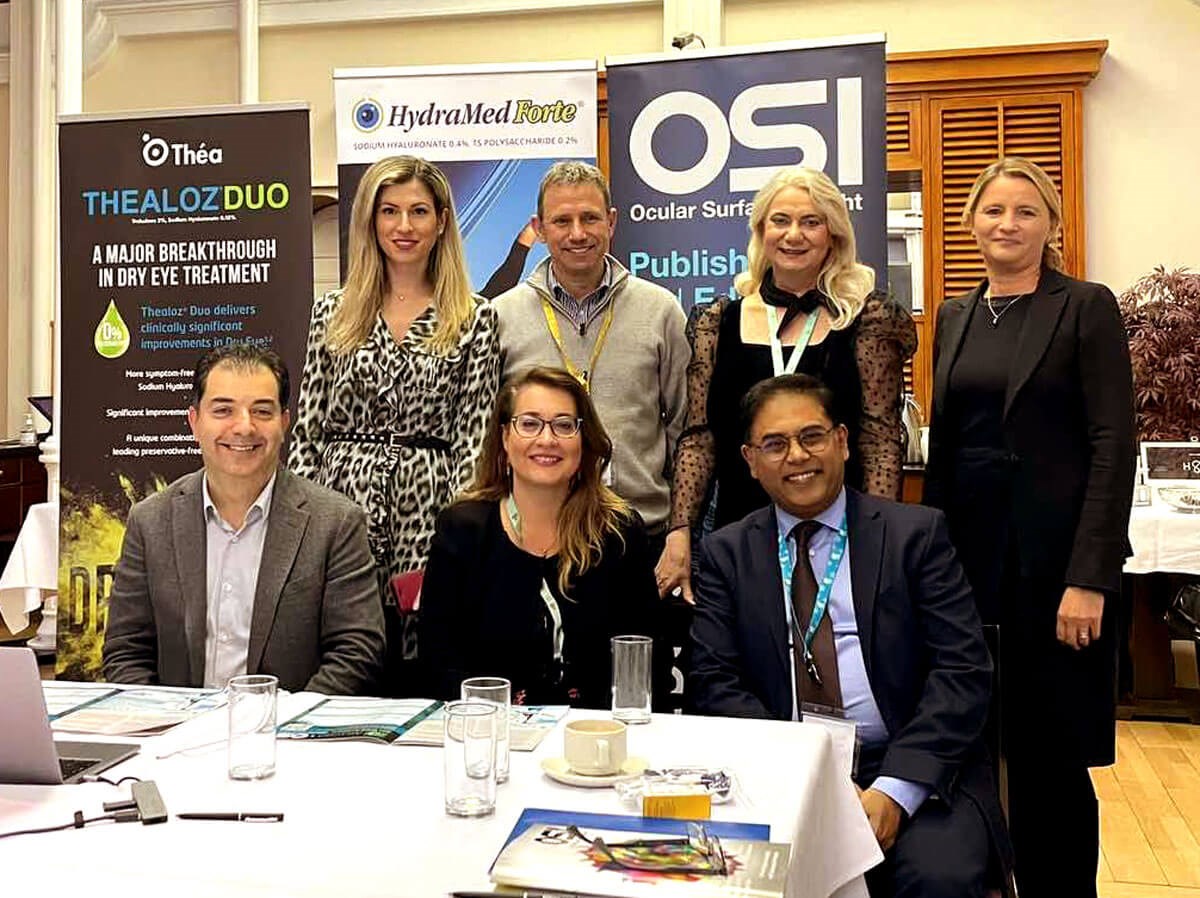We spoke to Andrena about MCLOSA's annual meeting this November, key developments in cornea and external eye disease, and plans for the association’s 30th anniversary.

Andrena McElvanney (top, second from right) and the OSI council members.
The Medical Contact Lens and Ocular Surface Association (MCLOSA) Annual Scientific Meeting kicks off in London on 25 November - what highlights can attendees look forward to?
We have several exciting symposia to look forward to. We start off in the morning, with a dedicated session on the management of keratoconus with contact lenses. It is important that ophthalmologists and optometrists alike are aware of the potential benefits of fitting patients with specialty contact lenses, in particular scleral lenses, as they can play an important part in the visual rehabilitation of patients, often with life-changing results.
The application of scleral lenses are particularly useful the management of corneal scarring and irregularity, and in those patients who are unsuitable for surgery.
The keratoconus session will outline the wide range of lenses used in the management of this condition and practical tips in fitting such patients. In particular, the session will cover the use of rigid gas permeable contact lenses, hybrid contact lenses and scleral and mini scleral contact lenses, as well as new advances in their use and application.
Another highlight will be the acanthamoeba symposium. Many ophthalmologists and optometrists have seen an increase in the number of patients affected with acanthamoeba keratitis over the past two years, in the wake of the COVID-19 pandemic. This can be a devastating and sight-threatening condition which can lead to blindness and even loss of the eye. This session will look in detail at the risk factors for acanthamoeba keratitis, diagnosis and imaging of the condition, and the treatment options available. In particular, the results of the recent Orphan Drug for Acanthamoeba Keratitis (ODAK) study will be presented. This is a project funded by the European commission which aims to develop polyhexamethylene biguanide (PHMB) as the first approved drug for the treatment of acanthamoeba keratitis. In addition, the symposium will look at the surgical options for the management of complications of the condition.
What are the key developments in cornea and external eye disease that the meeting will be covering?
In addition to the symposia mentioned already, there will also be an opportunity for delegates to be updated on current products for the management of ocular surface disease and dry eye, and there will be a session dedicated to lifestyle and the ocular surface.
Following the COVID-19 pandemic many of us are aware of the problems that can develop with Mask Associated Dry Eye (MADE) and it is important to be aware of the many factors that can influence ocular surface inflammation.
Professor Che Connon will be giving the Kersley lecture on “Tissue engineering the cornea” - how useful will this be for the attendees across different career stages?
For some time, it has become apparent that there is a significant shortage of corneas for transplantation in the United Kingdom, causing significant issues for patients as well as corneal transplant surgeons.
Currently, corneal transplantation in the UK is in crisis. This means that patients with surgically treatable disease are losing vision and corneal surgeons' skills cannot be put to use.
It is therefore essential that all means available for corneal rehabilitation are identified, and this lecture will be of interest to eye care professionals at any stage of their career.
Prof Che Connon will be addressing tissue engineering of the cornea, and the Kersley lecture will cover the following points:
- Overview of corneal biology
- Different approaches to tissue engineering
- Highlight how improvements in our understanding of corneal biology drive tissue engineering
- Examples of methods used to generate corneal tissue in the lab
- Examples of how tissue engineered models have given us ideas about corneal biology
- Translational pathway-how we are bringing these new technologies to the clinic.
The event closes with the presentation of the Bron Award - has there been a healthy crop of submissions this year?
The Bron award was named in honour of Professor Anthony Bron for his contribution to ocular surface disease research.
The ethos of the award is essentially: "Petri dish to patient."
It rewards research that focuses on the benefits to patients and which also seeks to challenge current medical practice.
In addition, it will focus on innovative research into areas of unmet medical need or areas where current treatment outcomes are considered sub-optimal or non-cost-effective.
MCLOSA encourages UK clinical / basic sciences research by a clinical research fellow or ophthalmology trainee (ST4 onwards), working in the area of ocular surface disease, to submit abstracts for the award. The research must be new and original, i.e., not presented in other meetings or published / submitted for publication in any journal, and MCLOSA is looking forward to a high standard of abstract submissions for this prestigious award. The winner will be presented with a cheque for £500.
MCLOSA is also accepting abstracts for poster presentation.
Next year will be the 30th year of the society - have you any big plans to celebrate?
MCLOSA is delighted to be celebrating its 30th anniversary next year. We are looking at different options to produce an exciting and original programme and hopefully will be collaborating with other societies to bring this to fruition and to make this an occasion to remember.
Are there an spoilers for next year’s meeting? Any clues as to what the meeting might seek to highlight?
As always, we look at feedback from our delegates as to topics that they wish to be covered in future meetings. We will take this on board and produce a programme based on the needs of our delegates and will be excited to confirm our Kersley lecturer for 2023.
Andrena McElvanney, thank you very much for speaking to us.
COMMENTS ARE WELCOME





